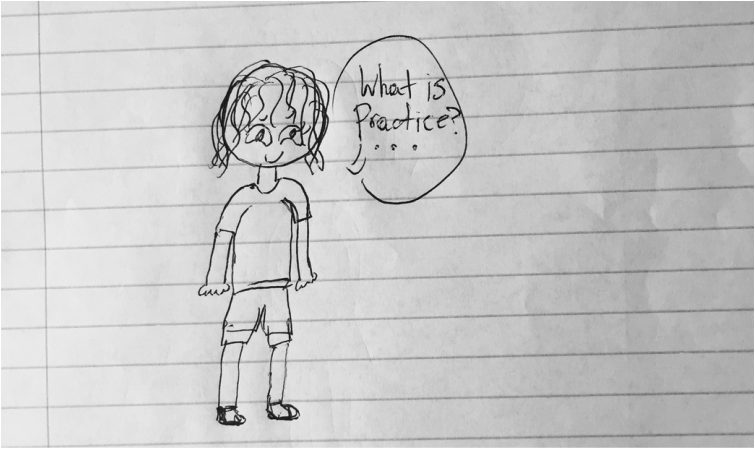|
So many times parents ask me, “How long should my child practice to get good?” Well…from the age 8-12, I practiced 30 minutes a day for 5 years. Was I pretty good? Yes, the hard work did pay off. I can safely say, I made my parents proud in my piano recitals and church performances. Did I come to enjoy it? Never. My negative feelings for piano never left during those 5 years of piano lessons. Eventually, my mother's will broke and she allowed me to stop taking lessons. I felt victorious. And I stopped playing piano for several years. So maybe, that’s the wrong question to ask. What about, “How can we make piano more fun?” or “How can I get my child to connect to their instrument?”
Sometimes, all you need is a good teacher to fuel that desire. I believe a good teacher makes a student believe that their dreams are not only possible but also, achievable in the very near future. Sometimes, it's a friend, a parent, a community, a society, an admirable musician or celebrity...the list goes on. The point is to find the origin and the, or lack of, and go from there. My problem that needed attention ASAP, was that I had no connection to the music I was playing. It was dull and boring to me and limited my ability to envision what I could actually do with this skill of playing piano. If my piano teachers had stepped in to broaden my view of piano, I could've lit that spark of musical passion much earlier. Once it was lit, I couldn't stop dreaming of where music could take me. It was a new, exciting, and powerful world. After slamming the door shut on piano and all my negative feelings associated with it, I was eventually able to reset my mind and put that resentment to rest. However, the desire to connect to music sought for another way. The fact was, I was musical. Music drew me in and music has always been a powerful force in my life. My mom knew this, she saw my talent and that was why she fought the battle for so long. But she didn't know how to press the "activate" button. Once you activate a musician, the desire to make music is eternal. (Now...can you make a musician or must you be born one? That'll have to be another blog...) My re-introduction to the music world was through the guitar. I chose the guitar because it screamed cool to a teenager. But more importantly, this time, I chose to begin this musical journey. I chose the music I wanted to play. Playing guitar eventually sparked my desire to re-learn piano and experiment with other instruments such as violin and percussion. I began pecking at the piano, trying to play songs by ear that I had heard on the radio. I wanted to be apart of the music that I liked to listen to. I watched YouTube videos, I asked other musicians, I was intrigued- my image of the piano finally changed- and I actually went out of my way to start practicing the piano. But this time, it didn't feel like practicing. The piano didn't equal boring sheet music anymore. Some days I practiced an hour, sometimes more, and some days it was 15 minutes. Except I didn't call it practicing. I saw it as a hobby- it was fun. And there is no set time for fun. I had now found a great way to communicate and create. Some of my music students practice their advised 20-30 minutes as often as they can during the week, but the ones that excel are the ones that never time their practice sessions. They're focused on reaching the goal rather than the time. To recap, check the student’s vision. Is it there? We want to make sure what's fueling the student comes from within. This will be evident when the student subconsciously setts goals for themselves. Next, how strong is their vision? Can the teacher or parent help fuel it? Support, even a little, can take a student a long way. Once my students reach their goals, they feel the work has paid off- they feel like champions. And being a champ, is fun.
1 Comment
"Practice hard, not hardly," my childhood piano teacher would remind me at the end of every lesson. But what does "practice hard" actually mean? What does it look like? Time is usually a good way to measure a practice session, especially in terms of accountability. When I first began teaching, I would follow this chart: Practice Chart Beginner: 15-20 minutes 4-5 times a week Intermediate: 30 minutes 5-6 times a week Advanced: 45-60+ minutes 5-6 times a week I still say it’s a good generalized chart to use on almost any developing skill, but it didn’t take long before I realized something was off. I would find my students still stumbling over songs after a week or two of practicing. I began to wonder how much of those 30 minutes were actually used for sharpening the brain. As we all know, quality is better than quantity. There are practicing methods that are better than others. So let’s talk details: 1. Warm up: 5 minutes Beginners: scales, chords, easy pattern exercises Intermediate/Advanced: advanced scales, chord progressions, Hanon and/or Czerny technique exercises Why? Warm-ups feel like a waste of time. I know- I also thought the same. But, warm-ups actually make piano playing easier. They strengthen your finger muscles, improve techniques and build better mind control. With your control and technique grounded, it will be much easier to read and play a song. Save some frustration and do your warm-ups. 2. Note reading: 10-20 minutes All levels should practice their assigned notes ON REPEAT. Before, I’d say “Practice this for 10 minutes”, but I’ve found that saying “Practice this piece 5 times” worked better. If you don’t repeat, your brain can never build on those new connections being formed. Now be sure to pay attention to this, because here’s the trick to learning faster. You’ve got to dissect the song - such as practicing the left and right hand separately, and then breaking the song into sections. Practice section one 3-5 times before moving on to the next section. Then combine section 1 and 2, before learning the third. The smaller the sections, the better- especially if you’re a beginner. This allows the brain to familiarize the finger patterns and notes, so then your muscle memory can kick in, which allows the brain to relax and focus on less. Anytime you overwhelm your brain, you move backwards. Not to mention, you will hate the learning process. Double backwards. 3. Listening Exercises: 10-15 minutes, or even 5 minutes several times a day A favorite of mine is learning songs by ear, which I heavily implement in every student’s lesson. We tend to look forward to this part. Since we depend on our ear and memory, I tell my students it’s important to practice this particular song several times a day (especially in the beginning) so you don’t forget the music. I tell them, “play it after our lesson, before you go to bed, and first thing in the morning- just to check that you haven’t forgotten it.” I come back a week later, and they’ve got it perfected. It works. You will find that this practice session looks very similar to the lessons I give. Yes, I’m glad you noticed. Now you’ll see, you’ve known how to practice all along. One more thing- notice in the Practice Chart, I mentioned how many times in a week one should practice. This is especially important because repetition is gold. You can have the 20-30 minute practice session perfected to every detail, but if you do that just 1-2 times a week, it’ll take us forever to move forward. Just like any hobby, you cannot get better at basketball or mathematical times tables without repeating the practice several times in a week. For example, let's say you're busy all week and only have time on the weekends, so you decide to make up for the time lost and put in several hours into one session. Then you get too busy for the next 5 days, and repeat another cramming session. That method of learning will take much longer and before you know it, discouragement sets in. You see, the brain forgets, and you will waste your time trying to remember the new things you've learned rather than building on them. So yes, 15-20 minutes 5-6 times a week is going to get you farther than 3-4 hours on the weekend. I am a firm believer in practicing- there's no way to reach your goals without it. However, I am also a firm believer in fun. If practicing causes constant emotional struggle, there is something wrong. Something needs to change. If you continue to grind against resistance, soon the brain will begin to flash PIANO = BAD. Once you get to that point, it will be very difficult to reverse, and the changes necessary will need to be more drastic and will involve more time. If you are a parent or a student who struggles with practice, please don’t continue just grinding on. You might’ve skipped an important step. My next blog, “My Child Doesn’t Want to Practice” can help redirect to a better approach.
|
Author(s)P&M Teachers: Archives
March 2024
|
||||||
|
Follow UsRegistered 501c3 organization EIN 38-4077902 © COPYRIGHT 2023. ALL RIGHTS RESERVED.
|


